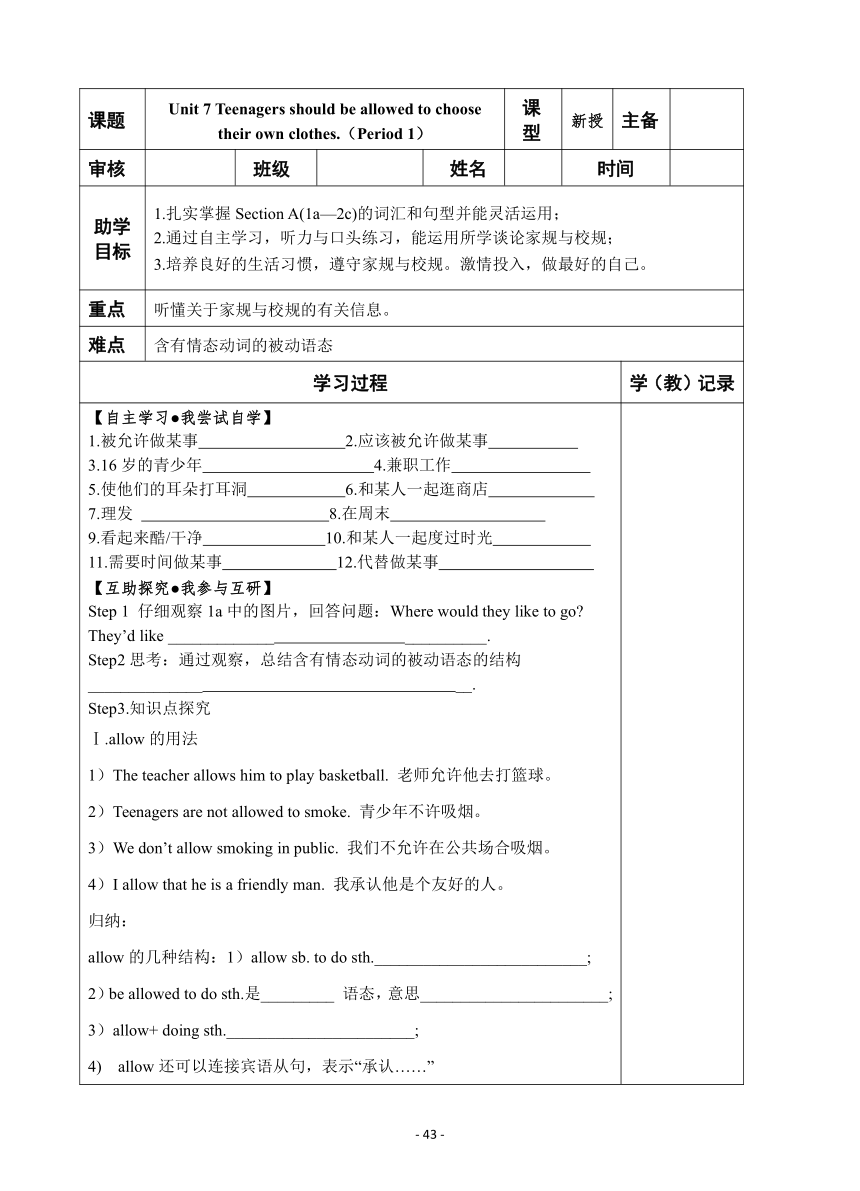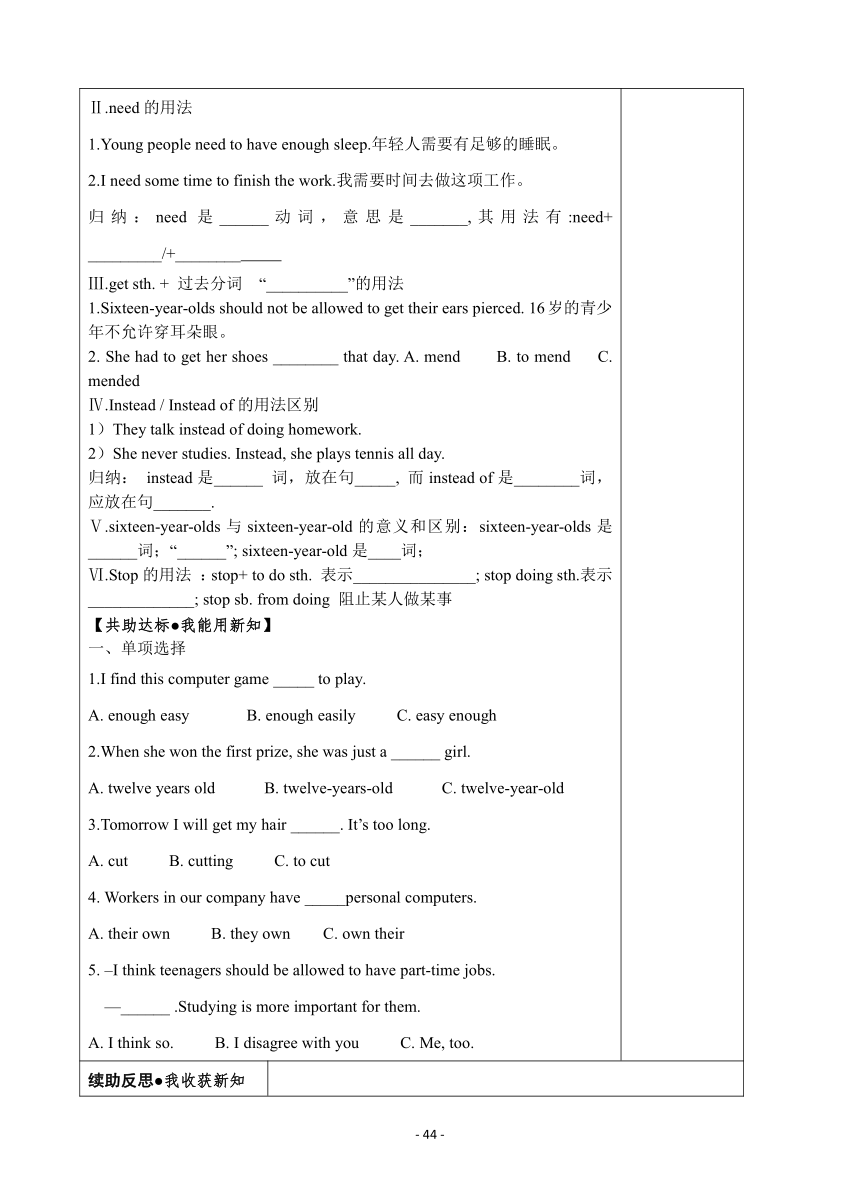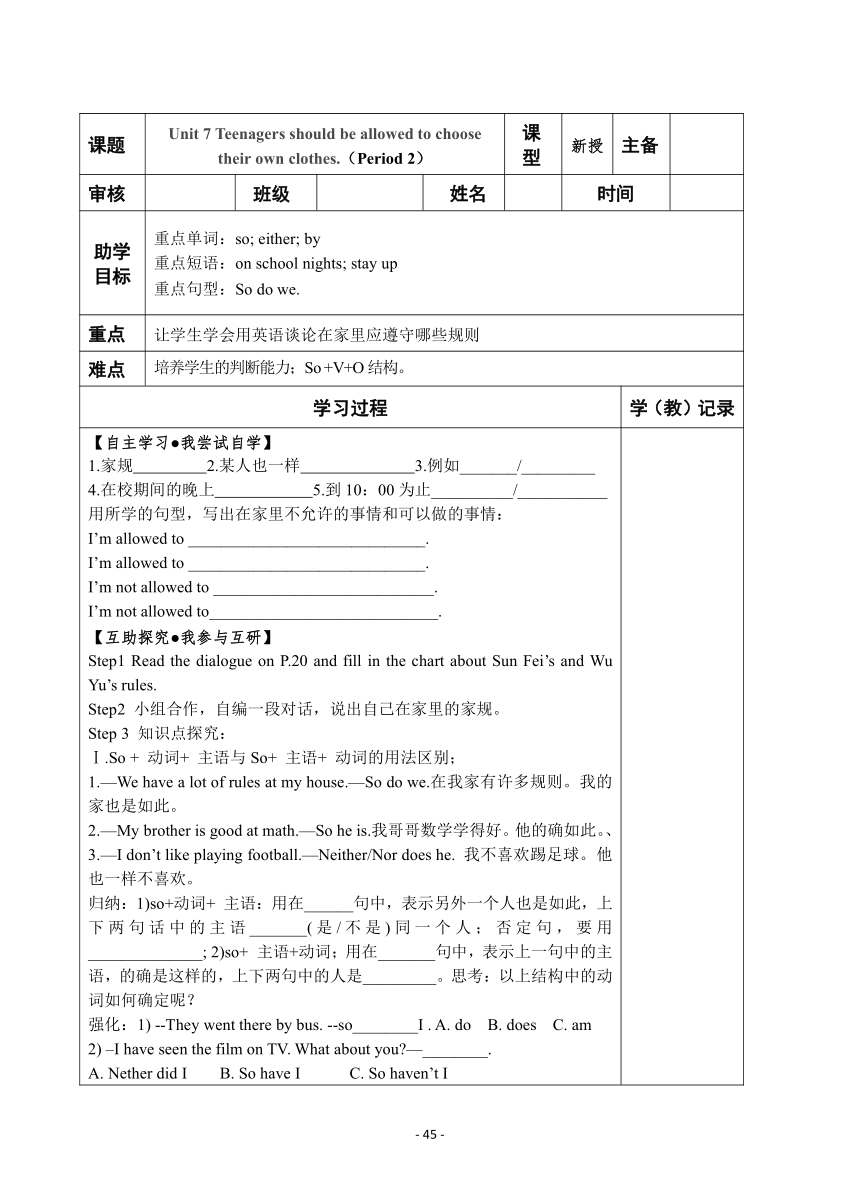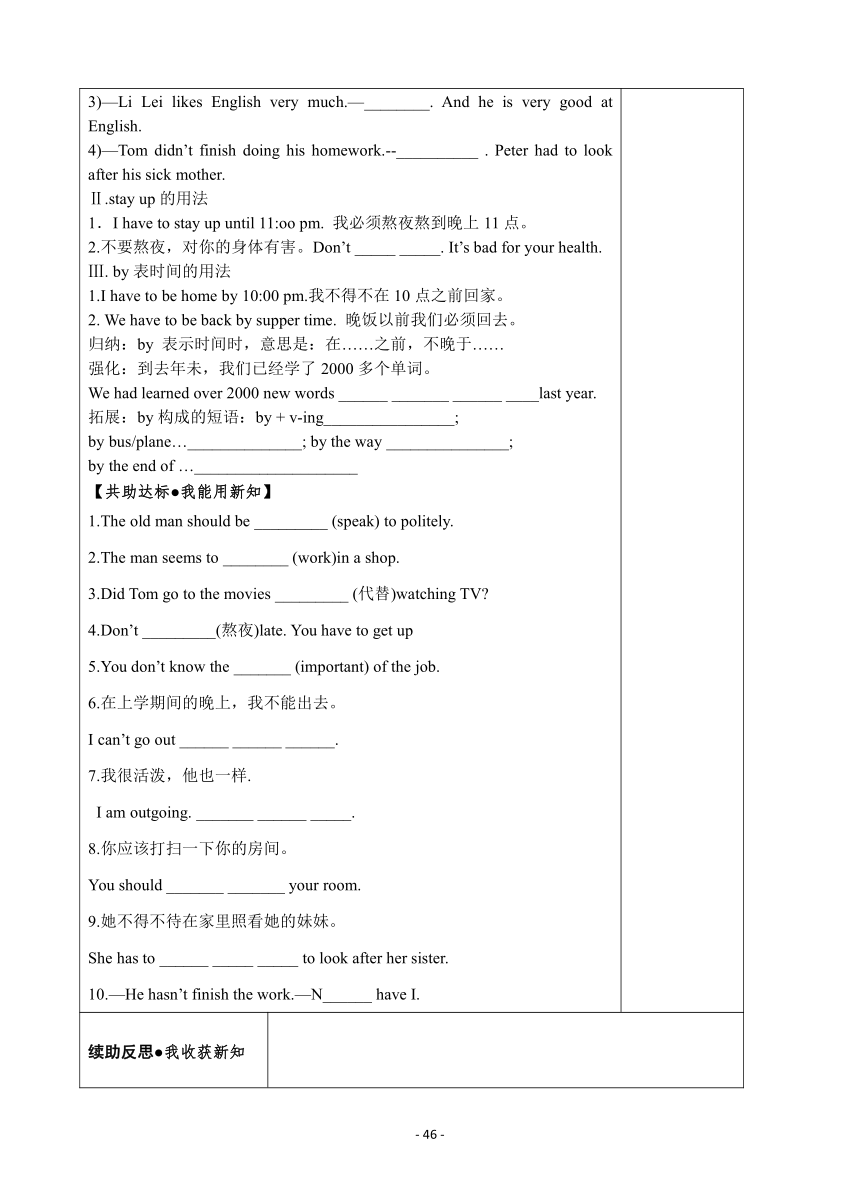新目标英语九年级全Unit 7 Teenagers should be allowed to choose their own clothes.导学案(全单元4课时,无答案)
文档属性
| 名称 | 新目标英语九年级全Unit 7 Teenagers should be allowed to choose their own clothes.导学案(全单元4课时,无答案) |  | |
| 格式 | zip | ||
| 文件大小 | 94.0KB | ||
| 资源类型 | 教案 | ||
| 版本资源 | 人教新目标(Go for it)版 | ||
| 科目 | 英语 | ||
| 更新时间 | 2019-11-15 15:49:06 | ||
图片预览




文档简介
课题 Unit 7 Teenagers should be allowed to choose their own clothes.(Period 1) 课型 新授 主备
审核 班级 姓名 时间
助学 目标 1.扎实掌握Section A(1a—2c)的词汇和句型并能灵活运用; 2.通过自主学习,听力与口头练习,能运用所学谈论家规与校规; 3.培养良好的生活习惯,遵守家规与校规。激情投入,做最好的自己。
重点 听懂关于家规与校规的有关信息。
难点 含有情态动词的被动语态
学习过程 学(教)记录
【自主学习●我尝试自学】1.被允许做某事 2.应该被允许做某事 3.16岁的青少年 4.兼职工作 5.使他们的耳朵打耳洞 6.和某人一起逛商店 7.理发 8.在周末 9.看起来酷/干净 10.和某人一起度过时光 11.需要时间做某事 12.代替做某事 【互助探究●我参与互研】Step 1 仔细观察1a中的图片,回答问题:Where would they like to go? They’d like _____________ __________. Step2思考:通过观察,总结含有情态动词的被动语态的结构______________ __.Step3.知识点探究Ⅰ.allow的用法 1)The teacher allows him to play basketball. 老师允许他去打篮球。 2)Teenagers are not allowed to smoke. 青少年不许吸烟。 3)We don’t allow smoking in public. 我们不允许在公共场合吸烟。 4)I allow that he is a friendly man. 我承认他是个友好的人。归纳: allow的几种结构:1)allow sb. to do sth.__________________________; 2)be allowed to do sth.是_________ 语态,意思_______________________; 3)allow+ doing sth._______________________; 4) allow还可以连接宾语从句,表示“承认……”Ⅱ.need的用法 1.Young people need to have enough sleep.年轻人需要有足够的睡眠。 2.I need some time to finish the work.我需要时间去做这项工作。归纳:need是______动词,意思是_______,其用法有:need+ _________/+________ Ⅲ.get sth. + 过去分词 “__________”的用法 1.Sixteen-year-olds should not be allowed to get their ears pierced. 16岁的青少年不允许穿耳朵眼。 2. She had to get her shoes ________ that day. A. mend B. to mend C. mendedⅣ.Instead / Instead of的用法区别 1)They talk instead of doing homework. 2)She never studies. Instead, she plays tennis all day.归纳: instead是______ 词,放在句_____, 而instead of是________词,应放在句_______.Ⅴ.sixteen-year-olds与sixteen-year-old的意义和区别:sixteen-year-olds是______词;“______”; sixteen-year-old是____词;Ⅵ.Stop的用法 :stop+ to do sth. 表示_______________; stop doing sth.表示_____________; stop sb. from doing 阻止某人做某事【共助达标●我能用新知】一、单项选择 1.I find this computer game _____ to play. A. enough easy B. enough easily C. easy enough 2.When she won the first prize, she was just a ______ girl. A. twelve years old B. twelve-years-old C. twelve-year-old 3.Tomorrow I will get my hair ______. It’s too long. A. cut B. cutting C. to cut 4. Workers in our company have _____personal computers. A. their own B. they own C. own their 5. –I think teenagers should be allowed to have part-time jobs.—______ .Studying is more important for them. A. I think so. B. I disagree with you C. Me, too.
续助反思●我收获新知
课题 Unit 7 Teenagers should be allowed to choose their own clothes.(Period 2) 课型 新授 主备
审核 班级 姓名 时间
助学 目标 重点单词:so; either; by重点短语:on school nights; stay up重点句型:So do we.
重点 让学生学会用英语谈论在家里应遵守哪些规则
难点 培养学生的判断能力;So +V+O结构。
学习过程 学(教)记录
【自主学习●我尝试自学】1.家规 2.某人也一样 3.例如_______/_________4.在校期间的晚上 5.到10:00为止__________/___________用所学的句型,写出在家里不允许的事情和可以做的事情: I’m allowed to _____________________________. I’m allowed to _____________________________. I’m not allowed to ___________________________. I’m not allowed to____________________________.【互助探究●我参与互研】Step1 Read the dialogue on P.20 and fill in the chart about Sun Fei’s and Wu Yu’s rules. Step2 小组合作,自编一段对话,说出自己在家里的家规。 Step 3 知识点探究:Ⅰ.So + 动词+ 主语与So+ 主语+ 动词的用法区别; 1.—We have a lot of rules at my house.—So do we.在我家有许多规则。我的家也是如此。 2.—My brother is good at math.—So he is.我哥哥数学学得好。他的确如此。、 3.—I don’t like playing football.—Neither/Nor does he. 我不喜欢踢足球。他也一样不喜欢。归纳:1)so+动词+ 主语:用在______句中,表示另外一个人也是如此,上下两句话中的主语_______(是/不是)同一个人;否定句,要用______________; 2)so+ 主语+动词;用在_______句中,表示上一句中的主语,的确是这样的,上下两句中的人是_________。思考:以上结构中的动词如何确定呢?强化:1) --They went there by bus. --so________I . A. do B. does C. am 2) –I have seen the film on TV. What about you?—________. A. Nether did I B. So have I C. So haven’t I 3)—Li Lei likes English very much.—________. And he is very good at English. 4)—Tom didn’t finish doing his homework.--__________ . Peter had to look after his sick mother.Ⅱ.stay up的用法 1.I have to stay up until 11:oo pm. 我必须熬夜熬到晚上11点。 2.不要熬夜,对你的身体有害。Don’t _____ _____. It’s bad for your health.Ⅲ. by表时间的用法 1.I have to be home by 10:00 pm.我不得不在10点之前回家。 2. We have to be back by supper time. 晚饭以前我们必须回去。归纳:by 表示时间时,意思是:在……之前,不晚于……强化:到去年未,我们已经学了2000多个单词。 We had learned over 2000 new words ______ _______ ______ ____last year.拓展:by构成的短语:by + v-ing________________; by bus/plane…______________; by the way _______________; by the end of …____________________【共助达标●我能用新知】1.The old man should be _________ (speak) to politely. 2.The man seems to ________ (work)in a shop. 3.Did Tom go to the movies _________ (代替)watching TV? 4.Don’t _________(熬夜)late. You have to get up 5.You don’t know the _______ (important) of the job. 6.在上学期间的晚上,我不能出去。I can’t go out ______ ______ ______. 7.我很活泼,他也一样. I am outgoing. _______ ______ _____. 8.你应该打扫一下你的房间。You should _______ _______ your room. 9.她不得不待在家里照看她的妹妹。She has to ______ _____ _____ to look after her sister. 10.—He hasn’t finish the work.—N______ have I.
续助反思●我收获新知
课题 Unit 7 Teenagers should be allowed to choose their own clothes.(Period 3) 课型 新授 主备
审核 班级 姓名 时间
助学 目标 1.通过小组合作口头练习运用所学句型,谈论学习中的困惑;2.通过听力训练,提高学生听力能力;3.通过对短文的阅读了解学校的规章制度;
重点 1.关于学生应遵守的规则的表述;2.理解短文知识点。
难点 运用所学知识给别人提供学习英语方法。
学习过程 学(教)记录
【自主学习●我尝试自学】(1) 课前预习P.53内容,写出下列词组: 1.上课迟到 2.和朋友一起学习 3.担心考试 4.严厉的制度 5.对某人太严 6. 考试及格 (2)课前预习P.54 2a,写出下列词组; 1.前些天 2.谈论制度 3.穿校服 4.关注于 5.对……有好处 6.做某事的好方法 7.当前 8有机会去做某事 9.对于某人来说是一个很好的经历 【互助探究●我参与互研】Step 1.同桌合作根据1a提供的短语,仿照1b,编对话。Step 2 阅读2a, 回答P.55的问题。 Step3 知识点探究Ⅰ.重点词和短语的用法 1.finish的用法;finish后接____词、______词或_______,不能接________.类似的动词还有_________________________________. 2. sometimes 的用法:是_____词;用于_______或_______时态;some times 表示__________, 此时time是____数名词;sometime 是_____词,意为________,可用于__________时态中;some time表示“_________”。3.fail (in) a test 考试不及格 拓展:通过考试___________; 参加考试___________ 强化:“因为他没有努力学习,所以他数学考试不及格。” He ______ _____ _____ ______ because he didn’t work hard. 4.get to 意为:________,同义词为________和______ in/at. get to 后面跟副词时,______要去掉。如:get home________; get there/here________ 强化;今天早上我到校晚了。I _______ ______ school late this morning. 5.be good for 意为____________, 反义词组为____________; be good at 意为____________. 反义词组为: do weak in 在…..弱。强化: 1)Taking exercise is good ______ you and reading in bed ______ your eyes. 2) He’s good _______ playing chess.Ⅱ.strict的用法: 1. Parents should not be too strict with teenagers.___________________ __. 2.强调:be strict with sb. _________________; be strict in sth___ ___.Our English _______ ______ _______ us, and she _______ also ______ ______ her work..Ⅲ.opportunity的用法 1.Last summer I had an opportunity to volunteer at the local hospital, but I couldn’t because I had to go back to school. 去年夏天我有一个机会去当地医院当志愿者,但是我没有去,因为我必须返校。 归纳:有机会去做某事__________________________. opportunity 是______词,后面接of的介词短语或____________. 2.volunteer 是_____词,指“_________”,当______词时,指“___________”,后接动词不定式。__________ _1)My friend ______ ________ _______ _______ study abroad. “我的朋友有一个出国的机会。” 2) Would you like to join our group ______ _______ ______ ? 你愿意参加我们组当一名志愿者吗?【共助达标●我能用新知】根据句意完成句子。 1. We all think he will f______ a test because he never works hard. 2. I’m glad that I have p______the exam. 3.We call the persons between 13 and 19 years old t______. 4.As a student, we must be s______ in our study. 5.Don’t w_______, there is a little time left. 6.When the movie actors came out, the audience(观念) got _____ (noise). 7.That is the best way to keep them ______ (happiness). 8. Eating vegetables is a good way ______ (keep) healthy. 9.I don’t think this kind of book should _______ (buy) 10. Peter has an opportunity ______ (work) in Beijing.
续助反思●我收获新知
课题 Unit 7 Teenagers should be allowed to choose their own clothes.(Period 4) 课型 新授 主备
审核 班级 姓名 时间
助学 目标 重点短语:old people’s home ; take time to do things ; have Friday afternoons off 重点句型:1)Some students should be allowed to have Friday afternoons off to volunteer and help others. 2) I would like to reply to the article “Helping and Learning” in your last newsletter. 2.能力目标:使学生学会用英语来表达自己的意思
重点 让学生从事例中学会去帮助别人。
难点 培养学生的判断能力、阅读能力。
学习过程 学(教)记录
【自主学习●我尝试自学】Step1. 预习相关内容,找出下列词组。1.至少 2.特殊的一天 3.老人院 4.花时间做某事 5.昏昏欲睡 6.答复 7.星期五下午休息 8.不同意某人 9.八小时睡眠 10.为一家报纸写稿 11.为他们表演了一个节目 【互助探究●我参与互研】Step 1 小组合作,利用3a信息,仿照3b, 编对话。 Step2 单独完成P.23 Part 1 根据所给单词的正确形式填空。翻译成汉语。 Step3 阅读Part2, 回答问题. 1.What should they be allowed to do? 2.What should they do? 3.What do I want to do? 4. What does Tian Ge want to do? 5. What should some students be allowed to do? Step4 知识点探究:Ⅰ.Many students are sleepy after a long week of classes. sleepy 是_______词,既可作______语,又可作______语,修饰_____ 词,意为_________ 而asleep是_______词,只能作______语。 强化:1)He didn’t _______ (sleep) well last night because of a bad dream. 2)Although she stayed up too late night, she doesn’t feel ______(sleep).Ⅱ.Some students should be allowed to have Friday afternoons off to volunteer and help others.应允许一些学生周五下午去当志愿者帮助别人。 have+时间+off意为“休假、请假,也可用“take+时间+off来表示 Miss Yang was ill and she had a day off.杨老师病了她请了一天假。 The teacher gave her__________ (三天休息)。Ⅲ.I would like to reply to the article “Helping and Learning” in your last newsletter.我想回答你们上期简讯上“帮与学”这篇文章中问题。 归纳:reply意为“回答,回复”。reply可作名词或动词,作动词接宾语时,常与介词______ 连用。但answer 要接宾语时,不需要跟任何介词。 强化:I have an e-mail to ______.A. reply B. replying C. answer to【共助达标●我能用新知】Ⅰ.根据句意和提示完成句子。 1.What a m______! You must clean it up at once. 2. Last year they went to an old p______ home and made the old happy. 3. At p_______ , teenagers are very busy with their study. 4. I can’t choose which book ______ (buy). 5. Everyone needs to have at least eight _______(hour) sleep at night.主动句转被动句 1 his mother told him not to waste time on fishing. ___________________________________________2 Father gave me a toy at Christmas. ___________________________________________3 This factory produces machine tools. ___________________________________________4 They should do it at once. ___________________________________________5 He is likely to let you down. ___________________________________________6 They named the child tom._________________________________________________
续助反思●我收获新知
PAGE
- 50 -
审核 班级 姓名 时间
助学 目标 1.扎实掌握Section A(1a—2c)的词汇和句型并能灵活运用; 2.通过自主学习,听力与口头练习,能运用所学谈论家规与校规; 3.培养良好的生活习惯,遵守家规与校规。激情投入,做最好的自己。
重点 听懂关于家规与校规的有关信息。
难点 含有情态动词的被动语态
学习过程 学(教)记录
【自主学习●我尝试自学】1.被允许做某事 2.应该被允许做某事 3.16岁的青少年 4.兼职工作 5.使他们的耳朵打耳洞 6.和某人一起逛商店 7.理发 8.在周末 9.看起来酷/干净 10.和某人一起度过时光 11.需要时间做某事 12.代替做某事 【互助探究●我参与互研】Step 1 仔细观察1a中的图片,回答问题:Where would they like to go? They’d like _____________ __________. Step2思考:通过观察,总结含有情态动词的被动语态的结构______________ __.Step3.知识点探究Ⅰ.allow的用法 1)The teacher allows him to play basketball. 老师允许他去打篮球。 2)Teenagers are not allowed to smoke. 青少年不许吸烟。 3)We don’t allow smoking in public. 我们不允许在公共场合吸烟。 4)I allow that he is a friendly man. 我承认他是个友好的人。归纳: allow的几种结构:1)allow sb. to do sth.__________________________; 2)be allowed to do sth.是_________ 语态,意思_______________________; 3)allow+ doing sth._______________________; 4) allow还可以连接宾语从句,表示“承认……”Ⅱ.need的用法 1.Young people need to have enough sleep.年轻人需要有足够的睡眠。 2.I need some time to finish the work.我需要时间去做这项工作。归纳:need是______动词,意思是_______,其用法有:need+ _________/+________ Ⅲ.get sth. + 过去分词 “__________”的用法 1.Sixteen-year-olds should not be allowed to get their ears pierced. 16岁的青少年不允许穿耳朵眼。 2. She had to get her shoes ________ that day. A. mend B. to mend C. mendedⅣ.Instead / Instead of的用法区别 1)They talk instead of doing homework. 2)She never studies. Instead, she plays tennis all day.归纳: instead是______ 词,放在句_____, 而instead of是________词,应放在句_______.Ⅴ.sixteen-year-olds与sixteen-year-old的意义和区别:sixteen-year-olds是______词;“______”; sixteen-year-old是____词;Ⅵ.Stop的用法 :stop+ to do sth. 表示_______________; stop doing sth.表示_____________; stop sb. from doing 阻止某人做某事【共助达标●我能用新知】一、单项选择 1.I find this computer game _____ to play. A. enough easy B. enough easily C. easy enough 2.When she won the first prize, she was just a ______ girl. A. twelve years old B. twelve-years-old C. twelve-year-old 3.Tomorrow I will get my hair ______. It’s too long. A. cut B. cutting C. to cut 4. Workers in our company have _____personal computers. A. their own B. they own C. own their 5. –I think teenagers should be allowed to have part-time jobs.—______ .Studying is more important for them. A. I think so. B. I disagree with you C. Me, too.
续助反思●我收获新知
课题 Unit 7 Teenagers should be allowed to choose their own clothes.(Period 2) 课型 新授 主备
审核 班级 姓名 时间
助学 目标 重点单词:so; either; by重点短语:on school nights; stay up重点句型:So do we.
重点 让学生学会用英语谈论在家里应遵守哪些规则
难点 培养学生的判断能力;So +V+O结构。
学习过程 学(教)记录
【自主学习●我尝试自学】1.家规 2.某人也一样 3.例如_______/_________4.在校期间的晚上 5.到10:00为止__________/___________用所学的句型,写出在家里不允许的事情和可以做的事情: I’m allowed to _____________________________. I’m allowed to _____________________________. I’m not allowed to ___________________________. I’m not allowed to____________________________.【互助探究●我参与互研】Step1 Read the dialogue on P.20 and fill in the chart about Sun Fei’s and Wu Yu’s rules. Step2 小组合作,自编一段对话,说出自己在家里的家规。 Step 3 知识点探究:Ⅰ.So + 动词+ 主语与So+ 主语+ 动词的用法区别; 1.—We have a lot of rules at my house.—So do we.在我家有许多规则。我的家也是如此。 2.—My brother is good at math.—So he is.我哥哥数学学得好。他的确如此。、 3.—I don’t like playing football.—Neither/Nor does he. 我不喜欢踢足球。他也一样不喜欢。归纳:1)so+动词+ 主语:用在______句中,表示另外一个人也是如此,上下两句话中的主语_______(是/不是)同一个人;否定句,要用______________; 2)so+ 主语+动词;用在_______句中,表示上一句中的主语,的确是这样的,上下两句中的人是_________。思考:以上结构中的动词如何确定呢?强化:1) --They went there by bus. --so________I . A. do B. does C. am 2) –I have seen the film on TV. What about you?—________. A. Nether did I B. So have I C. So haven’t I 3)—Li Lei likes English very much.—________. And he is very good at English. 4)—Tom didn’t finish doing his homework.--__________ . Peter had to look after his sick mother.Ⅱ.stay up的用法 1.I have to stay up until 11:oo pm. 我必须熬夜熬到晚上11点。 2.不要熬夜,对你的身体有害。Don’t _____ _____. It’s bad for your health.Ⅲ. by表时间的用法 1.I have to be home by 10:00 pm.我不得不在10点之前回家。 2. We have to be back by supper time. 晚饭以前我们必须回去。归纳:by 表示时间时,意思是:在……之前,不晚于……强化:到去年未,我们已经学了2000多个单词。 We had learned over 2000 new words ______ _______ ______ ____last year.拓展:by构成的短语:by + v-ing________________; by bus/plane…______________; by the way _______________; by the end of …____________________【共助达标●我能用新知】1.The old man should be _________ (speak) to politely. 2.The man seems to ________ (work)in a shop. 3.Did Tom go to the movies _________ (代替)watching TV? 4.Don’t _________(熬夜)late. You have to get up 5.You don’t know the _______ (important) of the job. 6.在上学期间的晚上,我不能出去。I can’t go out ______ ______ ______. 7.我很活泼,他也一样. I am outgoing. _______ ______ _____. 8.你应该打扫一下你的房间。You should _______ _______ your room. 9.她不得不待在家里照看她的妹妹。She has to ______ _____ _____ to look after her sister. 10.—He hasn’t finish the work.—N______ have I.
续助反思●我收获新知
课题 Unit 7 Teenagers should be allowed to choose their own clothes.(Period 3) 课型 新授 主备
审核 班级 姓名 时间
助学 目标 1.通过小组合作口头练习运用所学句型,谈论学习中的困惑;2.通过听力训练,提高学生听力能力;3.通过对短文的阅读了解学校的规章制度;
重点 1.关于学生应遵守的规则的表述;2.理解短文知识点。
难点 运用所学知识给别人提供学习英语方法。
学习过程 学(教)记录
【自主学习●我尝试自学】(1) 课前预习P.53内容,写出下列词组: 1.上课迟到 2.和朋友一起学习 3.担心考试 4.严厉的制度 5.对某人太严 6. 考试及格 (2)课前预习P.54 2a,写出下列词组; 1.前些天 2.谈论制度 3.穿校服 4.关注于 5.对……有好处 6.做某事的好方法 7.当前 8有机会去做某事 9.对于某人来说是一个很好的经历 【互助探究●我参与互研】Step 1.同桌合作根据1a提供的短语,仿照1b,编对话。Step 2 阅读2a, 回答P.55的问题。 Step3 知识点探究Ⅰ.重点词和短语的用法 1.finish的用法;finish后接____词、______词或_______,不能接________.类似的动词还有_________________________________. 2. sometimes 的用法:是_____词;用于_______或_______时态;some times 表示__________, 此时time是____数名词;sometime 是_____词,意为________,可用于__________时态中;some time表示“_________”。3.fail (in) a test 考试不及格 拓展:通过考试___________; 参加考试___________ 强化:“因为他没有努力学习,所以他数学考试不及格。” He ______ _____ _____ ______ because he didn’t work hard. 4.get to 意为:________,同义词为________和______ in/at. get to 后面跟副词时,______要去掉。如:get home________; get there/here________ 强化;今天早上我到校晚了。I _______ ______ school late this morning. 5.be good for 意为____________, 反义词组为____________; be good at 意为____________. 反义词组为: do weak in 在…..弱。强化: 1)Taking exercise is good ______ you and reading in bed ______ your eyes. 2) He’s good _______ playing chess.Ⅱ.strict的用法: 1. Parents should not be too strict with teenagers.___________________ __. 2.强调:be strict with sb. _________________; be strict in sth___ ___.Our English _______ ______ _______ us, and she _______ also ______ ______ her work..Ⅲ.opportunity的用法 1.Last summer I had an opportunity to volunteer at the local hospital, but I couldn’t because I had to go back to school. 去年夏天我有一个机会去当地医院当志愿者,但是我没有去,因为我必须返校。 归纳:有机会去做某事__________________________. opportunity 是______词,后面接of的介词短语或____________. 2.volunteer 是_____词,指“_________”,当______词时,指“___________”,后接动词不定式。__________ _1)My friend ______ ________ _______ _______ study abroad. “我的朋友有一个出国的机会。” 2) Would you like to join our group ______ _______ ______ ? 你愿意参加我们组当一名志愿者吗?【共助达标●我能用新知】根据句意完成句子。 1. We all think he will f______ a test because he never works hard. 2. I’m glad that I have p______the exam. 3.We call the persons between 13 and 19 years old t______. 4.As a student, we must be s______ in our study. 5.Don’t w_______, there is a little time left. 6.When the movie actors came out, the audience(观念) got _____ (noise). 7.That is the best way to keep them ______ (happiness). 8. Eating vegetables is a good way ______ (keep) healthy. 9.I don’t think this kind of book should _______ (buy) 10. Peter has an opportunity ______ (work) in Beijing.
续助反思●我收获新知
课题 Unit 7 Teenagers should be allowed to choose their own clothes.(Period 4) 课型 新授 主备
审核 班级 姓名 时间
助学 目标 重点短语:old people’s home ; take time to do things ; have Friday afternoons off 重点句型:1)Some students should be allowed to have Friday afternoons off to volunteer and help others. 2) I would like to reply to the article “Helping and Learning” in your last newsletter. 2.能力目标:使学生学会用英语来表达自己的意思
重点 让学生从事例中学会去帮助别人。
难点 培养学生的判断能力、阅读能力。
学习过程 学(教)记录
【自主学习●我尝试自学】Step1. 预习相关内容,找出下列词组。1.至少 2.特殊的一天 3.老人院 4.花时间做某事 5.昏昏欲睡 6.答复 7.星期五下午休息 8.不同意某人 9.八小时睡眠 10.为一家报纸写稿 11.为他们表演了一个节目 【互助探究●我参与互研】Step 1 小组合作,利用3a信息,仿照3b, 编对话。 Step2 单独完成P.23 Part 1 根据所给单词的正确形式填空。翻译成汉语。 Step3 阅读Part2, 回答问题. 1.What should they be allowed to do? 2.What should they do? 3.What do I want to do? 4. What does Tian Ge want to do? 5. What should some students be allowed to do? Step4 知识点探究:Ⅰ.Many students are sleepy after a long week of classes. sleepy 是_______词,既可作______语,又可作______语,修饰_____ 词,意为_________ 而asleep是_______词,只能作______语。 强化:1)He didn’t _______ (sleep) well last night because of a bad dream. 2)Although she stayed up too late night, she doesn’t feel ______(sleep).Ⅱ.Some students should be allowed to have Friday afternoons off to volunteer and help others.应允许一些学生周五下午去当志愿者帮助别人。 have+时间+off意为“休假、请假,也可用“take+时间+off来表示 Miss Yang was ill and she had a day off.杨老师病了她请了一天假。 The teacher gave her__________ (三天休息)。Ⅲ.I would like to reply to the article “Helping and Learning” in your last newsletter.我想回答你们上期简讯上“帮与学”这篇文章中问题。 归纳:reply意为“回答,回复”。reply可作名词或动词,作动词接宾语时,常与介词______ 连用。但answer 要接宾语时,不需要跟任何介词。 强化:I have an e-mail to ______.A. reply B. replying C. answer to【共助达标●我能用新知】Ⅰ.根据句意和提示完成句子。 1.What a m______! You must clean it up at once. 2. Last year they went to an old p______ home and made the old happy. 3. At p_______ , teenagers are very busy with their study. 4. I can’t choose which book ______ (buy). 5. Everyone needs to have at least eight _______(hour) sleep at night.主动句转被动句 1 his mother told him not to waste time on fishing. ___________________________________________2 Father gave me a toy at Christmas. ___________________________________________3 This factory produces machine tools. ___________________________________________4 They should do it at once. ___________________________________________5 He is likely to let you down. ___________________________________________6 They named the child tom._________________________________________________
续助反思●我收获新知
PAGE
- 50 -
同课章节目录
- Unit 1 How can we become good learners.
- Section A
- Section B
- Unit 2 I think that mooncakes are delicious!
- Section A
- Section B
- Unit 3 Could you please tell me where the restroom
- Section A
- Section B
- Unit 4 I used to be afraid of the dark.
- Section A
- Section B
- Unit 5 What are the shirts made of?
- Section A
- Section B
- Review of Units 1-5
- Unit 6 When was it invented?
- Section A
- Section B
- Unit 7 Teenagers should be allowed to choose their
- Section A
- Section B
- Unit 8 It must belong to Carla.
- Section A
- Section B
- Unit 9 I like music that I can dance to.
- Section A
- Section B
- Unit 10 You're supposed to shake hands.
- Section A
- Section B
- Review of Units 6-10
- Unit 11 Sad movies make me cry.
- Section A
- Section B
- Unit 12 Life is full of the unexpected
- Section A
- Section B
- Unit 13 We're trying to save the earth!
- Section A
- Section B
- Unit 14 I remember meeting all of you in Grade 7.
- Section A
- Section B
- Review of Units 11-14
